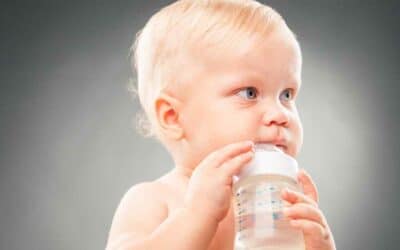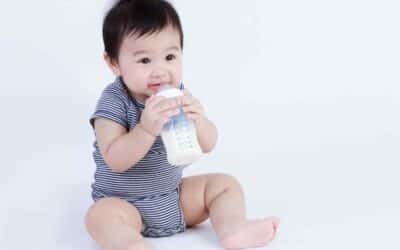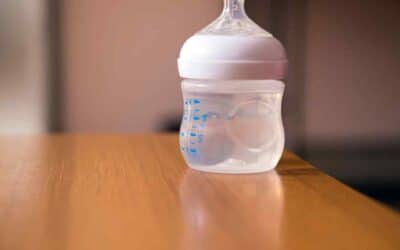As a parent, ensuring your baby is healthy and safe is a top priority. One important aspect of your baby’s well-being is the proper preparation of their infant formula. The type of water you use when making formula is critical, as it can directly impact your baby’s health.
In this blog, we’ll discuss the best practices for safe and healthy baby formula preparation with distilled water. We’ll cover everything from the types of water to avoid, the ideal temperature for the formula, and the importance of water safety.
By following these guidelines, you can help ensure your baby is receiving the safest and healthiest formula possible.
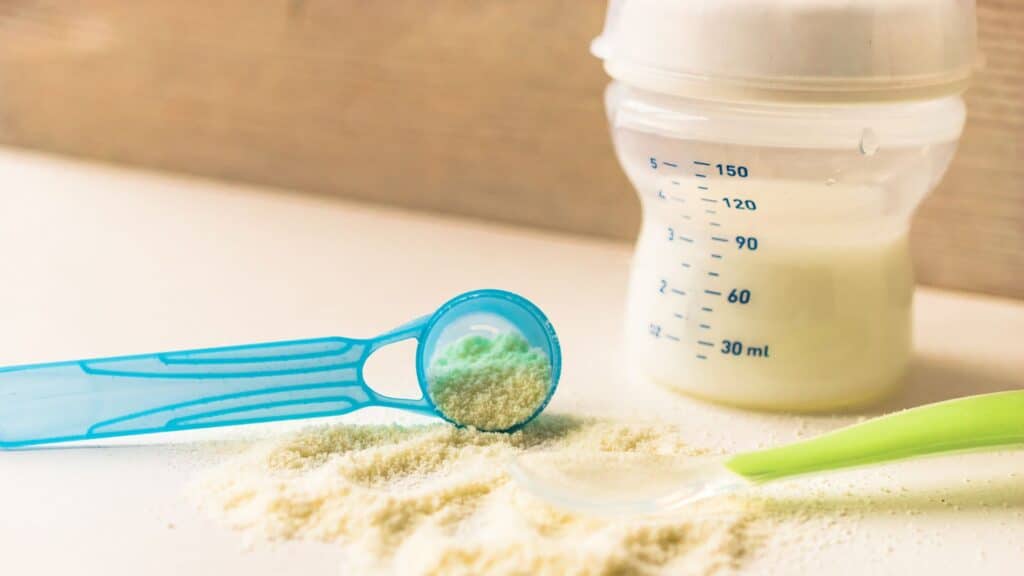
Understanding Distilled Water
Distilled water is water that has been purified through distillation. Distillation is the process of boiling water, collecting the steam that evaporates, and then condensing it back into liquid form. This process removes any dissolved solids from the water, including salt and minerals, which is why distilled water has a neutral pH.
Distilled water is often recommended for baby formula because it doesn’t contain any impurities that could harm newborns. It’s also a popular choice for cleaning products like mouthwash and laundry detergent because it kills bacteria without adding any harmful chemicals to your products.
According to the American Academy of Pediatrics, it’s important to ensure the water source used for baby formula is safe and free from contaminants. While distilled water may be a good choice, it’s essential to note that drinking large amounts of distilled water can lead to water intoxication, a potentially dangerous condition that can occur when too much water is consumed too quickly, causing an imbalance of electrolytes in the body. Therefore, it’s important to use a safe water source and follow proper guidelines when using distilled water for infants.
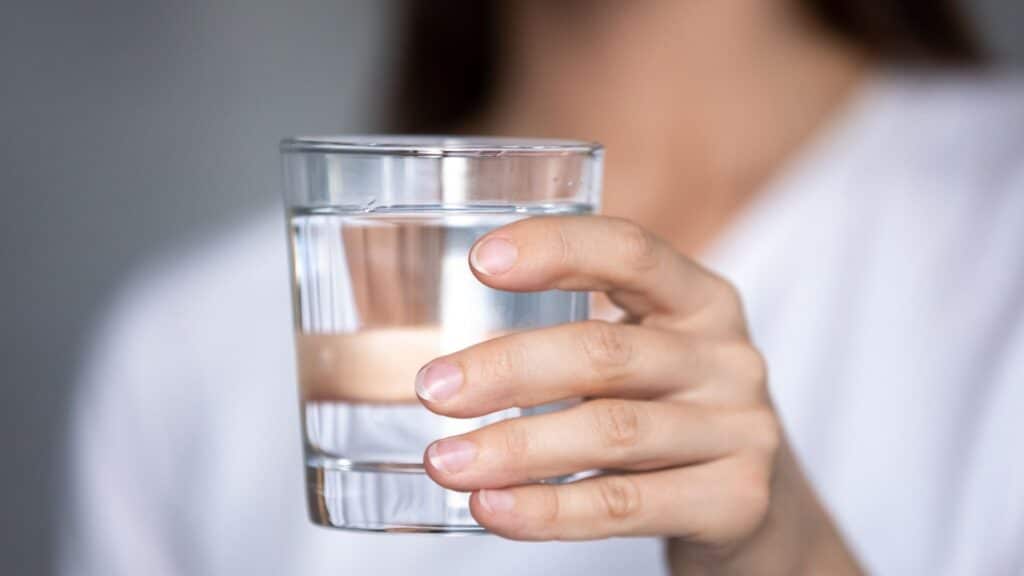
Best Practices for Baby Formula Preparation with Distilled Water
If you’re preparing baby formula with distilled water, it’s important to follow some best practices.
According to the American Academy of Pediatrics, it’s important to take additional safety tips when preparing a baby’s formula with distilled water. If your baby was born prematurely or is under two months of age, it’s recommended to use water that has been boiled for at least one minute to prevent electrolyte imbalances.
Importance of Measuring Water and Formula Accurately
It’s crucial to measure both the water and formula accurately when preparing infant formula. This includes using the correct ratio of powdered formula to water, as well as ensuring that the temperature of the formula is suitable for the baby’s delicate digestive system.
When measuring water for baby formula, it’s important to consider the type of water being used. Tap water is generally safe to use, but it may contain high levels of fluoride, which can be harmful to babies if consumed in excess. In such cases, low-fluoride bottled water or nursery water may be a safer option. It’s also important to make sure that the water is clean and free from contaminants, especially for families who use well water.
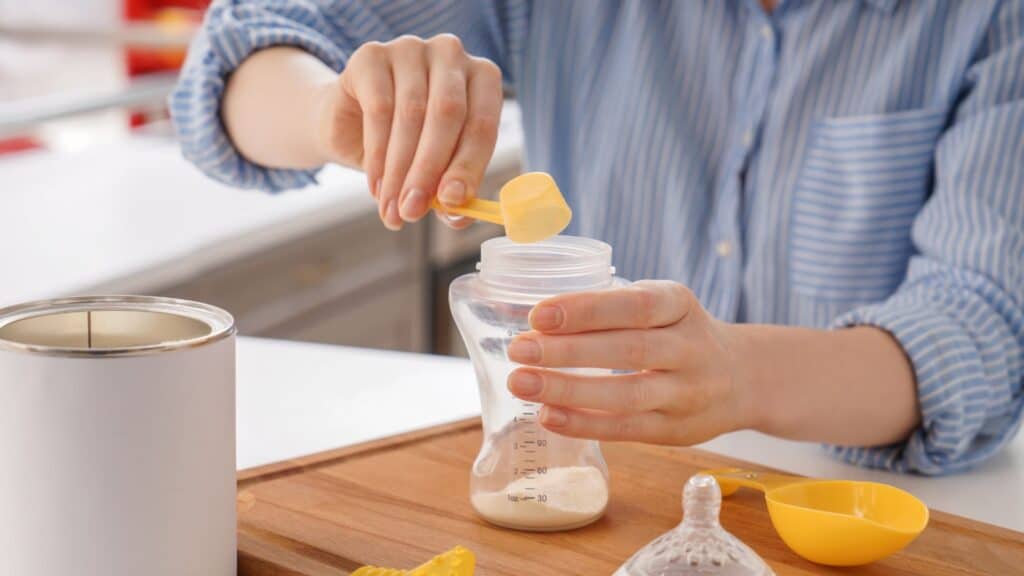
Temperature Considerations
When preparing a formula with distilled water, it’s important to remember that the temperature of the water matters. The formula should be prepared at room temperature, so if you’re using cold water, let it sit out for several minutes before mixing it with dry formula powder. If you’re using hot water, let it cool until it’s warm, not hot, and then mix it with dry formula powder.
Once the water is prepared, it’s crucial to mix the powdered formula with the water carefully, adding a few drops at a time until the desired consistency is achieved. Always check the formula temperature before feeding your baby, as the too-hot formula can cause burns or other injuries.
The American Academy of Pediatrics recommends that infant formula should be prepared with water that has been boiled and then cooled to a warm temperature before mixing with the formula powder. To do this, bring the distilled water to a rolling boil for one minute and then let it cool down for 30 minutes. It’s important to note that using hot water to mix with the formula powder can damage some of the nutrients and proteins in the powder.
Remember, it’s important to make sure that the formula is at the appropriate body temperature for the baby. This can be achieved by warming the formula in a bottle warmer, placing it in a warm water bath, or even using an ice bath to cool it down. By measuring water and formula accurately and following these guidelines, parents can help ensure that their babies are getting the nutrition they need without risking any negative health effects. Plus, being mindful of these steps can also help parents save money on costly medical bills down the line.
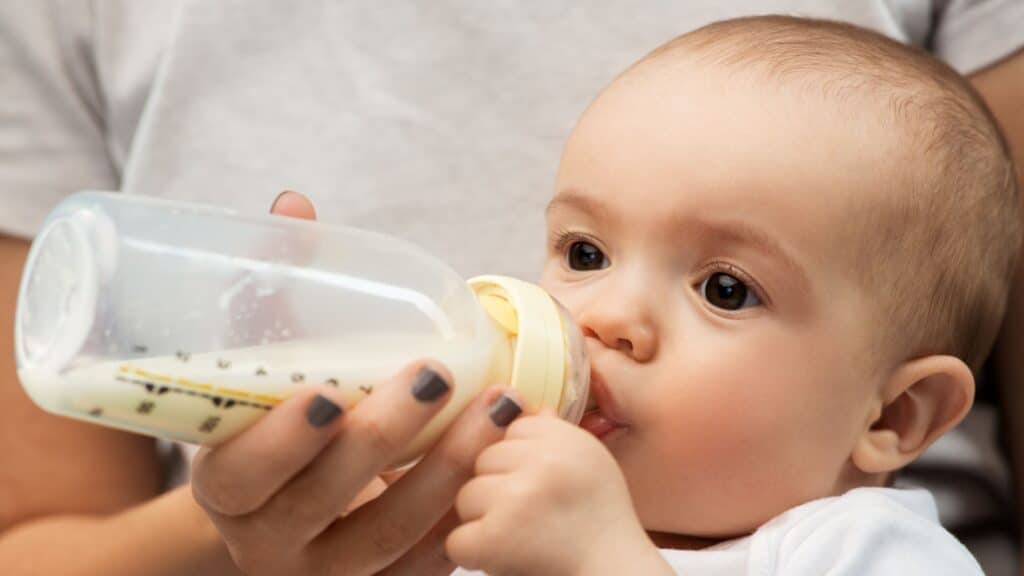
Tips for Storing and Reheating Prepared Formula
When storing and reheating prepared formula, it’s important to follow some basic guidelines to ensure your baby’s safety and health:
Store the formula properly: After preparing the formula, store it in the refrigerator as soon as possible, ideally within an hour of preparation. Keep the formula in a covered container and label it with the date and time of preparation. Formula stored in the refrigerator should be used within 24 hours.
Reheat the formula safely: Before reheating the formula, remove it from the refrigerator and let it sit at room temperature for no more than two hours. Never leave the formula at room temperature for longer than two hours, as this can promote the growth of harmful bacteria. When reheating, warm the formula in a bottle warmer or by placing the bottle in a bowl of warm water. Never microwave the formula, as this can create hot spots that can burn your baby’s mouth.
Discard any leftover formula: If your baby does not finish the formula within an hour of feeding, discard the remaining formula. Bacteria can grow quickly in the leftover formula, and reheating it may not kill all the bacteria.
Follow the manufacturer’s instructions: Always follow the manufacturer’s instructions when preparing and storing the formula. Different brands of formula may have different instructions for preparation and storage.
Use clean utensils and bottles: Make sure all utensils and bottles used for preparing, storing, and feeding formula are clean and sterilized. Wash all utensils and bottles with hot, soapy water and rinse well before using.
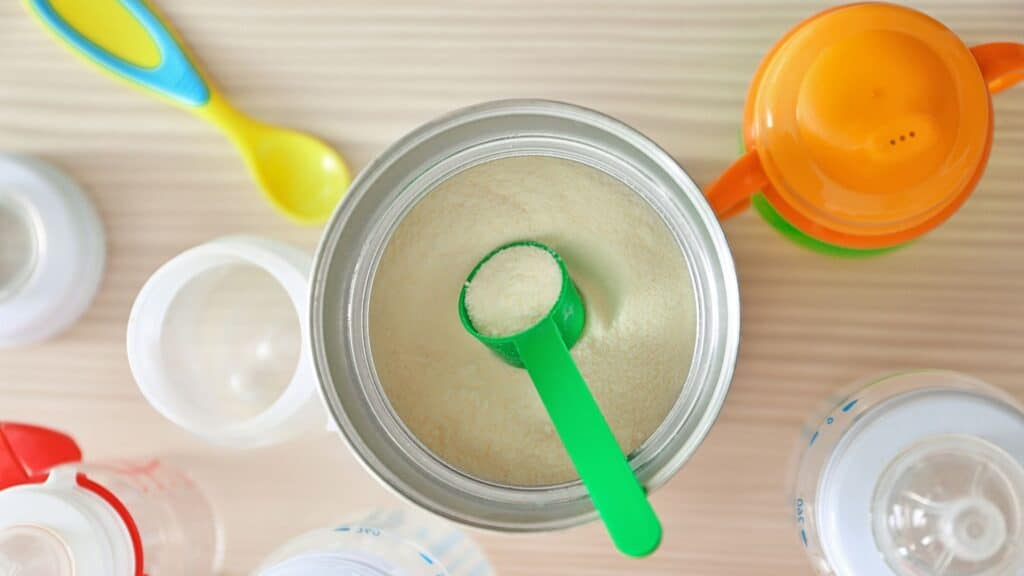
Safety Precautions to Follow
Before you begin your journey as a parent, it’s important to make sure that you are taking every precaution to keep your baby safe from germs and disease.
Sanitizing Bottles, Nipples, and Other Equipment
One of the best ways to do this is by correctly sanitizing bottles, nipples, pacifiers, and other items that come in contact with your baby. This can help prevent any unwanted health issues from arising down the road.
In order to properly sanitize these items, follow these simple steps:
- Wash bottles and nipples with soapy clean water before using them for the first time or after they’ve been washed by hand or put through a dishwasher cycle without being washed beforehand (this may not be necessary if they’ve never been used before).
- Fill a pot halfway with drinking water and bring it to a boil over high heat on the stovetop (you can also use a microwave if desired). Place all of your bottles and nipples inside, along with two tea bags (one per bottle) or one teaspoon of baking soda per gallon of water used. Boil for 10 minutes before removing items from the pot or microwave.
Handwashing and Hygiene Practices
Handwashing and hygiene practices are important in preventing the spread of bacteria.
Wash your hands with warm water and soap for at least 20 seconds, or use an alcohol-based hand sanitizer if you don’t have access to soap and water. Cover your mouth and nose with a tissue when you sneeze or cough, and throw it away immediately after use. Clean surfaces that may have come in contact with germs with a disinfectant.
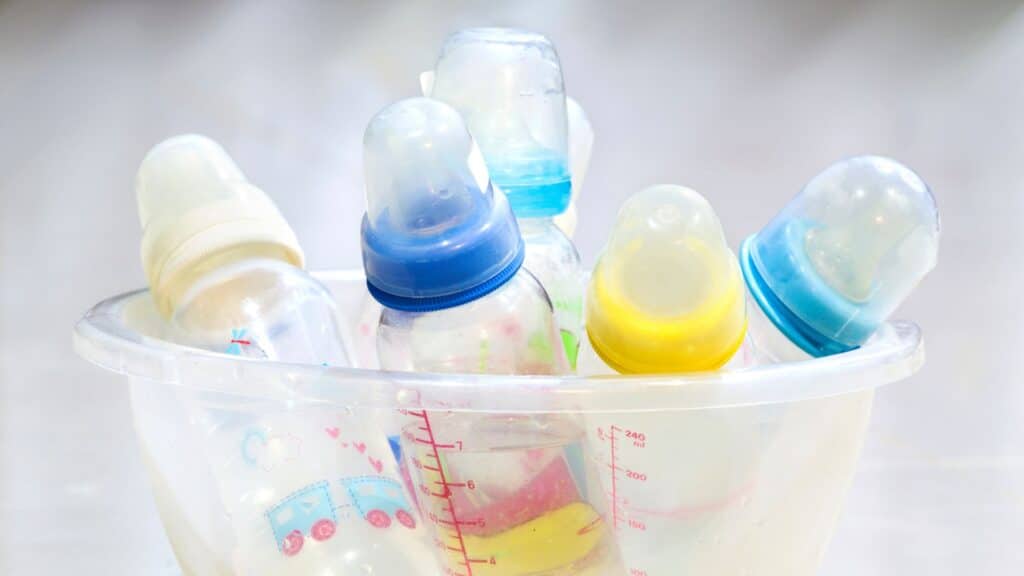
Importance of Using Clean, Safe Water Sources
When it comes to preparing baby formula, it is crucial to use clean and safe water sources. Infants, especially those born prematurely or with slow growth, are at higher risk for bacterial contamination and other waterborne diseases. Local health departments or the local water company can provide information on water quality and any potential contaminants in your area.
Some families choose to use bottled water or nursery water, but it’s important to note that not all bottled water is sterile or safe for babies. Fluoridated tap water can be used for formula preparation, but if you have well water or are concerned about the fluoride level in your water supply, you can have your water tested or consider using reverse osmosis. It’s also important to follow your baby’s doctor’s recommendation for fluoride supplements if needed. Breast milk is another safe option for a baby’s nutrition, as it doesn’t require any water for preparation.
Additionally, to prevent tooth decay, it’s important to never let your baby fall asleep with a bottle of formula or juice in their mouth. By using clean and safe water sources, you can ensure the safe preparation of your baby’s formula and reduce the risk of bacterial infection and other health concerns.
If you want to ensure that you are getting clean, safe drinking water every day, buy yourself a filter for your home so that all of your water comes out of it as clean and safe as possible.
Potential Pitfalls to Avoid
When preparing baby formula, it’s essential to avoid these potential pitfalls to ensure your baby’s health and safety:
Using Expired or Contaminated Formula
Always check the expiration date on the can and make sure it hasn’t passed. This is especially important for powdered formulas, which can lose potency over time. Additionally, be sure to inspect the formula for any signs of damage or contamination before use.
This is important because using expired or contaminated formula can pose serious risks to your baby’s health. It’s also important to note that proper formula handling and preparation is crucial for disease control and prevention, especially for babies with weakened immune systems.
The Environmental Protection Agency and Centers for Disease Control and Prevention have set standards for water quality and safety to help prevent contamination and ensure that the formula is safe for consumption.
Mixing Formula Incorrectly
It is important to pay close attention to the instructions provided by the manufacturer when preparing infant formula, whether it is a powdered formula, liquid concentrate formula, or ready-to-feed formula. Improper mixing or measurements can result in the formula being too weak or too strong, which can affect your baby’s nutrition and digestion.
If you have any questions or concerns about preparing formula correctly, consult your baby’s doctor or your local health department for guidance. Furthermore, disease control and prevention and environmental protection agencies, such as the Centers for Disease Control and the Environmental Protection Agency, can provide valuable information regarding water safety and disease prevention, especially for infants with weakened immune systems. Nationwide
Children’s Hospital also provides guidance on how to properly mix infant formula to ensure the best possible nutrition for your baby.
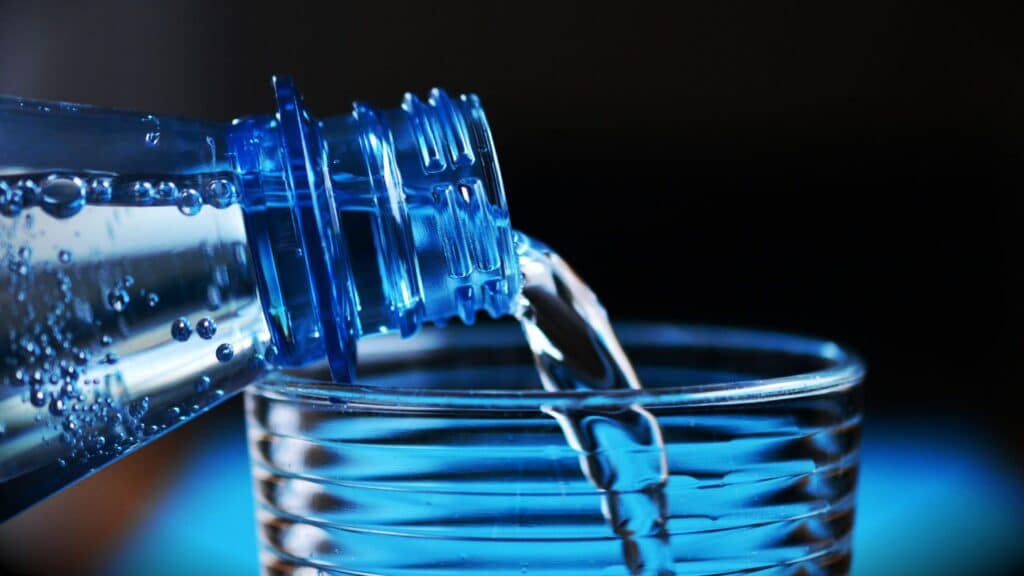
Using Water That’s Not Distilled or Not Safe for Consumption
When preparing infant formula, it’s important to be mindful of the water you use. Using water that’s not distilled or not safe for consumption could potentially harm your baby. It’s best to use distilled water as it’s free of any harmful minerals or contaminants.
However, if you can’t access distilled water, make sure to check the safety and cleanliness of your water source. If you’re unsure about the safety of your tap water, consult with your healthcare provider or consider using bottled water that’s specifically labeled as safe for infant consumption.
Additionally, it’s important to avoid using fluoridated water when preparing baby formula, as infants can easily consume too much fluoride, which may lead to dental fluorosis. Instead, consider using distilled water, low-fluoride bottled water, or boiling tap water for at least one minute to remove potential contaminants.
Conclusion
In conclusion, preparing baby formula can be a stressful task for parents, but following the best practices for safe and healthy preparation can make it a lot easier. Using distilled water is recommended for preparing baby formula as it does not contain any impurities that could harm newborns. It’s also important to measure water and formula accurately, pay attention to temperature considerations, and follow proper storage and reheating guidelines.
Additionally, taking safety precautions, such as sanitizing bottles and other equipment, can help keep your baby safe from germs and disease. By following these tips, parents can ensure that their baby’s food is prepared safely and that they receive all the nutrients they need to grow and develop.
If you have any questions, please feel free to leave a comment below. We’ll be more than happy to help!

